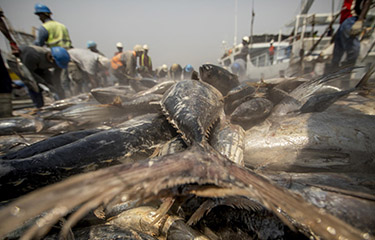The World Wildlife Fund (WWF) has launched a new platform intended to identify areas that are likely to experience maritime conflict or food insecurity due to climate-driven fisheries migration.
The Oceans Futures program, launched at The Halifax International Security Forum on 18 November, is a response to a 20-fold increase in fisheries conflict over the last four decades and a projected 23 percent of global fish stocks migrating due to climate change, according to the WWF.
Oceans Futures has already identified seascapes that are expected to experience increased fisheries conflict as a result of climate change, including the Arctic Ocean, the Gulf of Guinea, the Eastern Mediterranean, the Eastern Tropical Pacific, and the Central Pacific, along with 20 regions of the world that will likely see conflict, food insecurity, or geopolitical tensions over fisheries by 2030.
Besides countries bordering Arctic waters, Cameroonian, Syrian, Ecuadorian, Indonesian, and Micronesian waters are included in the regions identified. These hotspots were pinpointed by combining data on fisheries movement with socioeconomic and security information, including nutrition profiles, economic levels, the presence of foreign fishing vessels, and contested maritime borders.
“We have a unique opportunity to predict and prevent future fish wars that will have devastating impacts on people and nature,” WWF Senior Vice President for Oceans Johan Bergenas said. “In launching Oceans Futures, we are bringing together the partners, the science, the data, and the solutions to deliver a more sustainable and peaceful future.”
The platform’s initial rollout combines projections for shifting fish stocks over time driven by climate change and explains how these migrations can increase the risk of competition and conflict in fisheries.
Its “early warning” analysis can help countries and international bodies identify opportunities for coordination and action on priority conservation and conflict-prevention efforts, according to Admiral Paul Zukunft (Retired), the 25th Commandant of the U.S. Coast Guard.
“As a career seagoing service member, I've witnessed firsthand how dwindling global fish stocks drive conflict and threaten communities’ main source of nutrition and economic stability,” Zukunft said. “These dynamics will have geopolitical consequences as competition over ocean resources are likely to escalate. Oceans Futures will be the go-to handbook for nations around the globe to chart a new course for the future security and environmental stability of our oceans and the world.”
Oceans Futures partners include the Environmental Defense Fund (EDF), the International Conservation Caucus Foundation (ICCF), and Ode Partners.
“Climate change and national security are irrevocably linked; this has never been clearer than with depleting fish stocks around the globe due to illegal fishing and overfishing,” International Military Council on Climate and Security Secretary General and Woodrow Wilson International Center Senior Fellow Sherri Goodman said. “With the Oceans Futures initiative, the international community will be able to visualize how these challenges are impacting fisheries and the lives of key coastal communities, encouraging us to come together and take action to preserve these vitally important resources.”
Photo courtesy of WWF/Kyle Laferriere







